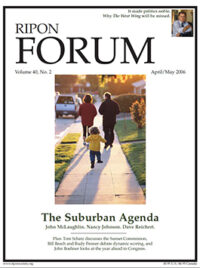An editorial, printed verbatim from the March/ April 1966 edition of the Ripon Forum:
Political Scene
Last month fort-five different House Republicans joined in groups of varying size to issue two in-depth statements, one on the draft, the other on foreign aid; eighteen introduced a Civil Rights Law Enforcement Act of major significance. The spearhead for the initiative was once again the Wednesday Group of moderate Republicans, joined in the draft study by Congressman John Anderson(Ill.), Tom Curits (Mo.), Albert Quie (Minn.) and Don Rumsfled (Ill.)
It is good to see initiative among Congressional Republicans, in spite of glaring non-leadership at the top. At long last, it appears, Republicans who want the GOP to have the opportunity someday to solve the nation’s problem have set about themselves to convince the voter that Republicans have something worthwhile to say.
Foreign Aid
The statement on foreign aid is the product of a six-month study by minority member of the Foreign Affairs and Appropriations Committees. Their analysis is comprehensive and provocative. Pointing out that “if we made no effort to guide the revolution of rising expectations in a peaceful course toward political stability and economic prosperity, we will soon have to choose between ‘war of national liberation’ everywhere or an illusory isolation in a world where the cause of freedom seems doomed to failure,” the Congressman assert that”[a]n economic infrastructure cannot provide meaningful human progress unless it springs from a vibrant human infrastructure.”
Specifically, the Republicans recommend defined criteria to assure that aid recipients are encouraging broad popular participation in government and development, and are taking steps to minimize efficiency. Emphasizing the short as well as the long term role education must play, the statement call for: the establishment of a Latin American Civil Service Academy funded in part by the U.S.; a Latin American Institute for Democratic Development under the joint sponsorship of the Republicans and Democratic Parties; technical management training by U.S. business abroad; expanded links between U.S. labor unions and workers in the developing countries; and increased efforts by U.S. farm and agriculture worker’ organizations to export agricultural modernization.
Urging a greater role for the private sector of the U.S. economy, the Congressmen recommend: the loan by business (at its own expense) of junior executive talent to AID on a rotating 1-year basis; Congressional consideration of the Watson Committee recommendations to increase U.S. investment in developing countries; and a greater use of U.S. private investment to fund and manage specific projects, thereby freeing Aid to concentrate on the overall political administration of development.
Perhaps the most innovative proposal is that the U.S. states establish aid programs to individual countries in Latin America by enlisting the state’s business, academic and professional communities’ support of a state coordinated program.
The thrust of the analysis is that U.S. foreign aid must be used aggressively rather than as an exercise in goodwill. The concrete recommendations coalesce in a plea for recognition insist on ignoring; that there are some things the federal government cannot do better. It is shortsighted to think that AID officials are always more competent than practicing businessmen and lawyers to forge the tools of economic development. Conversely, the statement recognizes that political supervision and overall administration by AID is essential.
The Draft
The statement calling for an immediate Congressional investigation for the draft and the methods used to persuade our allies to supply manpower to Vietnam and Southeast Asia received extensive coverage by national news media. It charges inequities in the ad hoc prescription of limits on age, mental and physical capacity, and inequities in the operation ill-defined guidelines for student deferment. It charged bureaucratic inefficiency in the Processing of papers, and Defense Department inefficiency in the employment of drafted service personnel on jobs (such as gold course maintenance and officer club bar tending) which should be held by civilians.
Finally, the Congressman point out that a year ago the President directed the Secretary of Defense to undertake a study of the Selective Service System and to provide precise recommendation on how the service manpower needs of the nation could best be met. The completed study, which General Hershey has never seen, sits unpublicized on Mr. McNamara’s desk.
And Civil Rights
The introduction by Republican Congressmen of Civil Rights Law Enforcement Act of 1966 is a notable event in the Party’s history. The legislators recognize that courts are handicapped by inadequate, imprecise and antiquated criminal statutes. With studied deference to the federal system they also recognize that the scope of the Fourteenth Amendment is broad enough to accommodate legislation aimed at: providing an objective and equitable standard for jury organized violence; and making governmental employers civilly liable in damages for acts of violence committed by public officials. Recent Supreme Court opinions in the Guest and Price cases would seem to support this judgment. The progress of the bill should be watched with care; we intend to do so. RF




